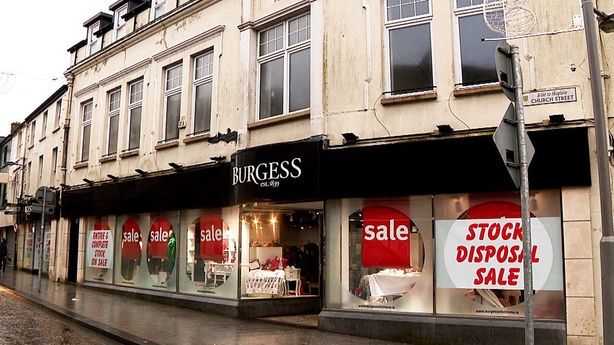Few Irish businesses have witnessed as many changes in Ireland's economy as Burgess Department Store.
A fixture of Athlone’s Church St since 1839, it has survived famine, war, pandemics and more boom-bust cycles than can be listed here.
For nearly two centuries, the customer has been both king and queen. Director Alastair Gray said the business is coming into 2023 in rude health. Business has rebounded well after the pandemic.
The same can be said for the economy as a whole. Last year’s exchequer figures see Ireland Inc thriving as it enters 2023, more than can be said for many of our neighbours.
Ireland’s exchequer surplus of more than €5 billion is a huge swing from 2021’s €7.4 billion deficit. But with record corporate tax returns swelling the state coffers, are we on a sustainable footing? And could a global recession put a pin in Ireland’s balloon?
The staff in Burgess are preparing for a major January sale, the kind that has perhaps fallen by the wayside for many retailers, squeezed out by Black Friday and pre-Christmas sales.
Burgess isn’t an international chain. It can play by its own rules, but it has had to adapt to survive. Mr Gray says that they were "put to the sword in 2009" and the years that followed, but they adapted to meet customers’ needs.
"People are very aware of supporting their local indigenous businesses," Mr Gray told Prime Time.
Added onto the department store now is what they call "The Village", a small number of independent businesses including a book store, coffee shop and sushi bar. It’s a long way from 1839.

Mr Gray is surprised by how much people were spending in the last year or two but he’s optimistic, despite what he calls the pessimism in the air.
"It’s not going to turn us into millionaires, but it means that we’re a little more comfortable than we were maybe seven years ago," he said.
Burgess has kept a diverse range of products since it opened, never relying on one single offering.
It’s a prudent strategy that also serves economies quite well. Corporation tax is now Ireland’s second-largest source of taxation and it's concentrated in a small number of companies.
This comes at a time when the tech sector is shedding jobs.
Daragh McGreal, economics director with KPMG, said that corporation tax’s significance to the exchequer is a risk that needed to be managed.
But he also said that Ireland was in a relatively lucky position.
"Many countries would love to have this problem where you’ve got too much revenue coming in," he said, noting that the glut of corporation tax has allowed the Government to make large one-off spending decisions and to buttress the State’s rainy-day fund.
Hovering over Ireland’s booming growth is the spectre of inflation.
Chris Giles, economics editor for the Financial Times, said that it is the greatest challenge this year to economies like Ireland’s, noting that inflation in the euro zone is running far above the ECB’s 2% target.
But he said that things, broadly, were looking up.

"Not only is Ireland doing better than expected, but lots of European economies have been doing better than expected," Mr Giles said.
He said that the rapid decline in wholesale gas prices would help bring inflation down in the short term.
But, for Ireland in particular, the ECB’s remedy for inflation – high interest rates – could further slow the progress of both buying and building houses, a front on which Ireland is already struggling.
ECB rate rises this year represent a delicate balancing act.
"We know that interest rates are going to be rising through this year, potentially to 3.5%" Mr McGreal said.
"You will have two parallel impacts: the inflation and the interest rate increases."
There are also external threats to Ireland’s economic prospects. Recessions in the economies of our major trading partners would spell bad news for Irish exports. The UK economy in particular is contracting much faster than had been expected.
Globally, the picture is perhaps not as bad as it looked when the initial predictions for 2023 were made, particularly as runaway wholesale energy prices began to stabilise. A rocky start to 2023 for the global economy may run more smoothly as the year progresses.
Are there reasons to be cheerful? Well, there are reasons to be less gloomy than many of the more dire predictions had suggested.
Many of those predictions focused on the end of 2022 – which didn’t end up going too badly. Many economists think, on the other hand, that things will fare better in 2023.
"Through the year," Mr Giles said, "if you look at the detail of their forecasts, they expect it to be getting better."
"By this time next year, everyone should be feeling a little bit brighter."






